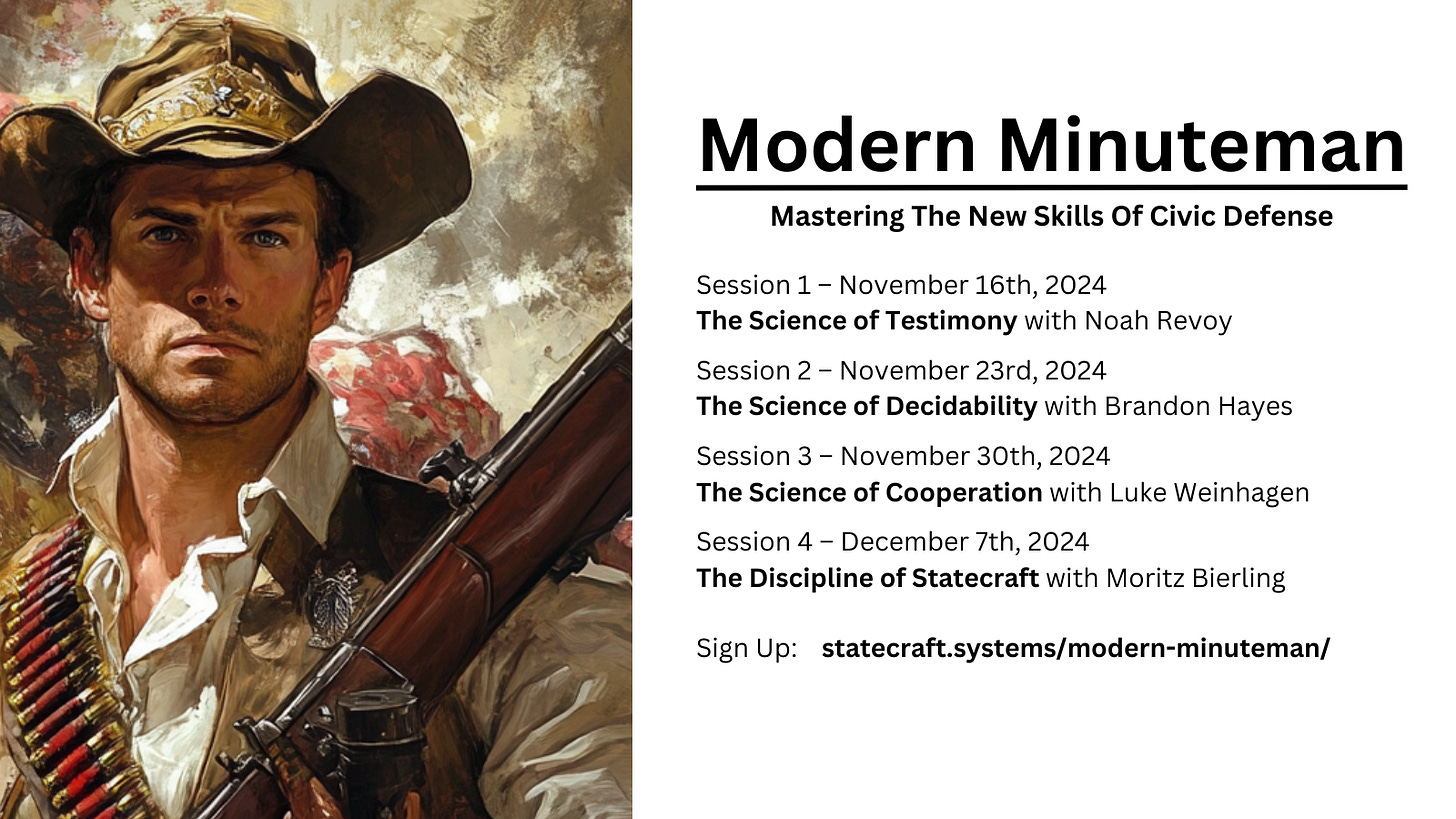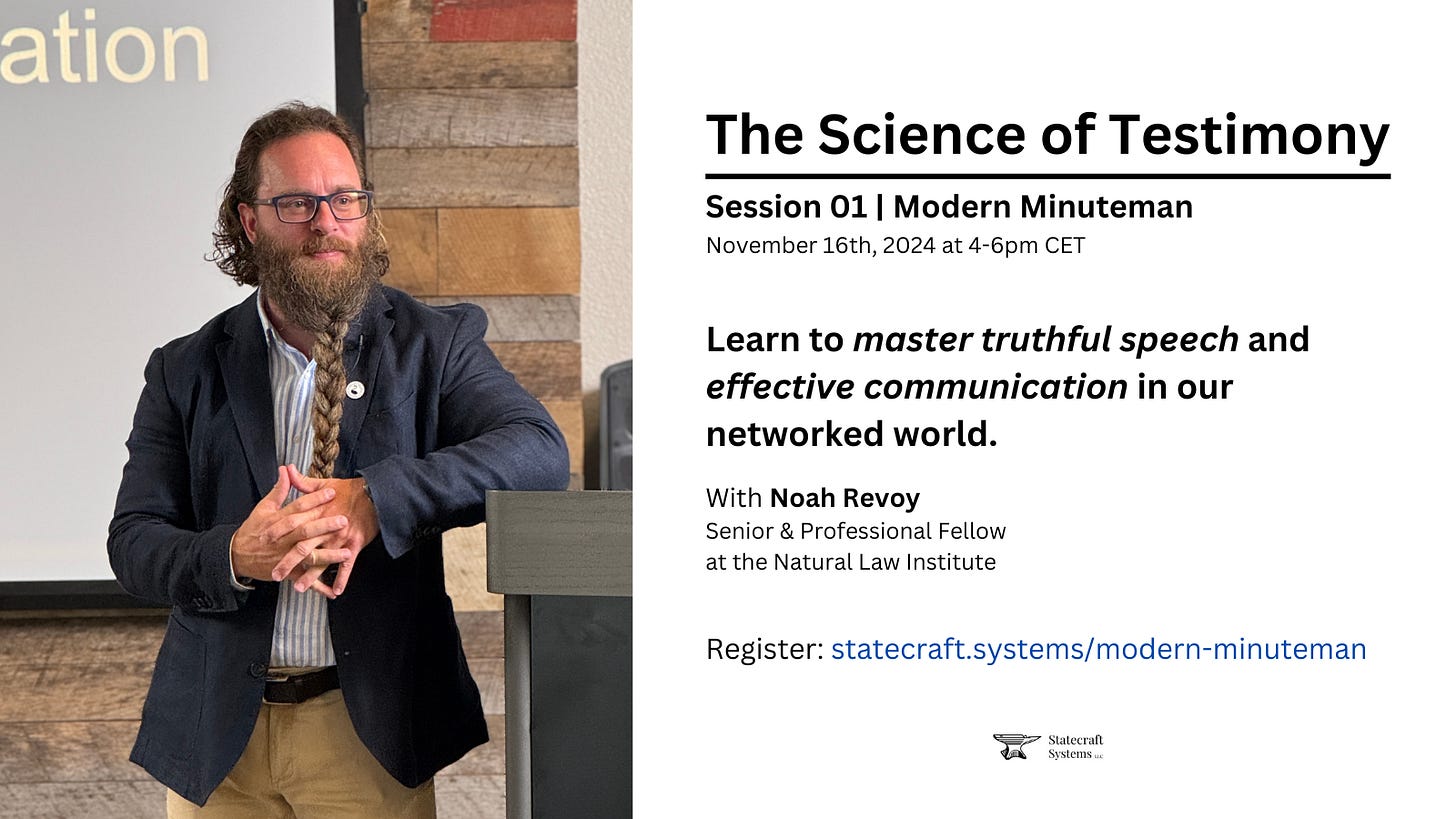Dear friends,
I've been quiet here for a while, and today I want to share something I've been working on. The project draws inspiration from an interesting piece of American history: the Minutemen of the American Revolution.
The Minutemen were civilian volunteers who committed to being ready for military action at a minute's notice. They weren't professional soldiers – they were farmers, craftsmen, and merchants who maintained their regular lives while developing and maintaining specific capabilities their communities might need in times of crisis. What made them special wasn't just their willingness to serve, but their dedication to mastering the military skills of their time: musket shooting, formation drilling, rapid mobilization.
This historical model has been on my mind lately as I've studied how power and influence work in our networked world. The nature of civic challenges has fundamentally shifted. Where the Minutemen faced clear physical threats that required physical capabilities, today's challenges are primarily informational and cognitive in nature – yet no less real in their impact on our communities and institutions.
The questions that keep coming up are: What are the equivalent capabilities needed for civic defense today? How do we develop and maintain them in a world where the tools of influence and coercion have shifted so dramatically toward information warfare?
A Program Takes Shape
These questions led me to develop a new program called Modern Minuteman. Just as the original Minutemen systematically developed the capabilities their communities needed, this program focuses on four essential sciences for our time:
1. The Science of Testimony
In a world of sophisticated disinformation and artificial content, how do we systematically separate signal from noise? This isn't about fact-checking – it's about developing robust frameworks for knowledge verification and reality alignment at scale.
2. The Science of Decidability
Information warfare often aims to create decision paralysis through complexity overload. We study how to maintain strategic clarity and ability to act even in highly complex or uncertain situations.
3. The Science of Cooperation
Individual capability isn't enough when facing systematic disruption. We examine how to build and maintain resilient networks of cooperation, moving beyond fragile alliances to robust systems of coordinated action.
4. The Discipline of Statecraft
Here we integrate these capabilities into coherent systems of action. How do we move from individual skills to lasting institutional capability? How do we ensure our defensive and constructive efforts persist and scale?
What This Looks Like in Practice
The program consists of four weekly sessions, starting November 16th. Each two-hour session combines theoretical understanding with practical application, led by instructors who have deep experience in these domains.
Between sessions, participants will have opportunities to apply these concepts to their own contexts and challenges. The goal isn't just to understand these capabilities, but to develop them in ways that serve real needs.
Is This Relevant for You?
You might find this program valuable if you:
Want to move the world in a particular direction but find yourself frustrated by the complexity of actually doing so
Seek to understand how change really happens in networked systems, beyond simple narratives of influence and power
Are ready to develop systematic capabilities rather than just accumulating more information
Care about being more effective in whatever positive direction you're working toward
This program might not be a good fit if you:
Are looking for ready-made solutions or simple formulas for change
Prefer to focus on theory without engaging in practical application
Are not currently active in trying to create some form of positive change, whether personal, professional, or social
The First Session: The Science of Testimony
Our journey begins tomorrow, November 16th with our first session on The Science of Testimony, led by Noah Revoy, Senior Fellow at the Natural Law Institute. This two-hour workshop will tackle a fundamental challenge of our time: how do we master truthful speech and effective communication in our networked world?
The session will combine theoretical foundations with practical exercises, helping participants develop concrete skills in crafting clear statements, recognizing manipulation, and encouraging honest communication. You'll leave with immediately applicable tools for both personal and public communication.
What makes this session particularly valuable is its focus on testimony as a foundational skill – one that underpins all other aspects of effective action in complex environments. Whether you're working to influence public discourse, build trust in your community, or simply communicate your ideas more effectively, the ability to craft and recognize truthful, precise communication is essential.
Want to Know More?
If you're interested in learning more or potentially joining the program, you can find the full details and registration information here:
I'm happy to answer any questions you might have, either in the comments below or via direct message. And regardless of whether this particular program interests you, I'd love to hear what you are working on and where you’re getting stuck.
Warmly,
Moritz
---
Modern Minuteman is a program by my company Statecraft Systems LLC, focused on developing core capabilities for civic defense in the information age.






Sounds really cool, and the vibe of being an Information Minuteman is based. Gave also heard excellent things about Noah Revoy, so that's great social proof.
Looks like I missed the first session yesterday evening (only saw this post today, and had other commitments).
Looks like you are going to release transcripts and/or recordings? Would it still be worth it to join the remaining three sessions live?
Hey Moritz, this sounds really interesting and I'm ready to join. Will the sessions be recorded? Since this is so short notice I can't make the first session tomorrow.